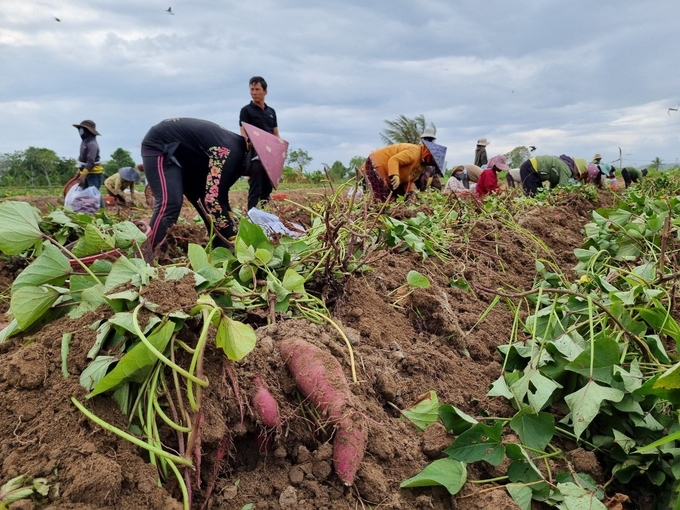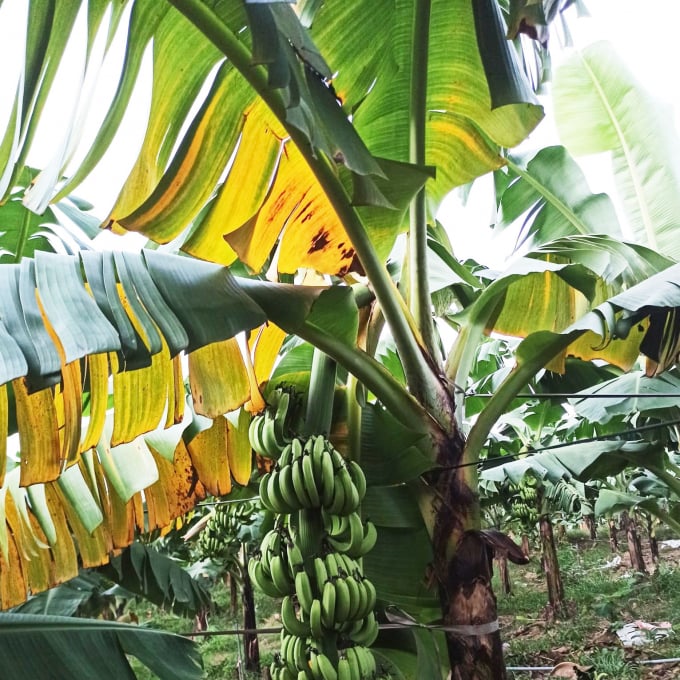June 2, 2025 | 16:01 GMT +7
June 2, 2025 | 16:01 GMT +7
Hotline: 0913.378.918
June 2, 2025 | 16:01 GMT +7
Hotline: 0913.378.918
Professor Dr. Nguyen Hong Son, Director of the Vietnam Academy of Agricultural Sciences (MARD) mentioned the restructuring of crops, the formation of specialized production areas, the increase in the cultivation of perennial crops, intensification, the use of chemical fertilizers, and the reduced use of organic fertilizers, along with limited pest management capacity among farmers, a lack of tools, and effective and feasible farming processes. These factors all contribute to the risk of outbreaks and the spread of soil pests across various crops and ecosystems nationwide, with increasing severity.

In recent years, soil pests have had an increasingly serious impact on many crops, including sweet potatoes. Photo: VAN.
Soil pests are especially damaging fruit trees and perennial industrial crops, causing significant losses, such as quick and slow death disease in pepper plants, seedling death during coffee replanting, root rot in durians, leaf drop in citrus, root rot in dragon fruits, wilting in bananas, and bacterial wilt in solanaceous and cucurbit crops.
Soil pests are difficult to control, and prevention is often ineffective because they are not detected in time or properly addressed. Additionally, at any given time, one or multiple pathogens may appear on a single crop, causing a variety of symptoms, making it challenging to implement effective control measures and increasing costs.
Key diseases affecting major crops include leaf blight and seedling death (caused by Pythium, Phytophthora, Rhizoctonia, Sclerotium rolfsii, and Fusarium spp.) on vegetables, flowers, field crops, fruit trees, and ornamental plants, such as those in the mustard, cucurbit, solanaceous, legume, and aster families.
Root rot (caused by Pythium, Phytophthora, Rhizoctonia, Cylindrocladium, Phellinus spp., Rosellinia, Ganoderma, Armillaria, Pratylenchus) affects woody plants, vegetables, fruit trees, and ornamental plants. Stem rot, crown rot, and collar rot (caused by Phytophthora, Sclerotium, Rhizoctonia, Sclerotinia, Fusarium, occasionally Aspergillus niger, Erwinia) affect vegetables, ornamental plants, and mushrooms.
Bacterial wilt and yellowing (caused by Ralstonia solanacearum, Fusarium oxysporum) affect vegetables, flowers, field crops, fruit trees, and ornamental plants. Yellowing (caused by Fusarium, Nematodes) affects vegetables and flowers. Root swelling (caused by Nematodes, Plasmodiophora) affects vegetables and plants in the mustard, cucurbit, and solanaceous families.

Panama disease (caused by Fusarium spp. in the soil) has greatly affected banana production in our country. Photo: VAN.
Although there has been extensive research on disease-causing agents, studies on effective control processes are still limited or follow only the principles of integrated pest management (IPM). Effective and feasible control processes and tools are lacking. Sustainable biological control measures have not been widely applied, and their effectiveness remains low.
Therefore, applying integrated disease management (IDM) is considered a comprehensive and sustainable approach used in agriculture to control plant diseases.
IDM emphasizes prevention, early detection, and the use of multiple tools to maintain healthy plant populations and achieve optimal yields. Key management measures include plant quarantine, using disease-resistant varieties and rootstocks, farming practices (solarization, soil fumigation, raised planting, crop rotation), good drainage, synthetic pesticides, fumigants, seed treatments, soil pH improvement (increasing the use of organic fertilizers as buffers, using soil amendments like lime and biochar, and appropriate phosphorus fertilizers), and promoting biological control using preparations such as Trichoderma spp. and Streptomyces spp.
Translated by Kieu Chi

(VAN) Novel process harnesses machine learning to reveal groups of genes that determine how efficiently plants use nitrogen.

(VAN) Several scientists and farmers are experimenting with soil treatment in some key durian-growing regions such as Cai Lay (Tien Giang), Dak Song, Gia Nghia, and Dak R’lap (Dak Nong).
/2025/05/25/4127-3-073637_820.jpg)
(VAN) Thanks to the promotion from an FAO-implemented project, vegetable production in greenhouses in Moc Chau has seen strong development, from 1.5 hectares in 2021 to nearly 50 hectares in 2024.

(VAN) FAO has recently supported USD 140,000 to implement the project 'Risk mitigation human-animal interface risks through disease control initiatives in pig farming.'

(VAN) The People's Committee of Tra Vinh province has approved an adjustment to the investment policy for the Green Hydrogen Plant project, increasing its area to approximately 52.76 hectares.
![Reducing emissions from rice fields: [2] Farmers’ commitment to the soil](https://t.ex-cdn.com/nongnghiepmoitruong.vn/608w/files/news/2025/05/05/dsc08881jpg-nongnghiep-140632.jpg)
(VAN) Clean rice cultivation model in Thuong Tan commune, Bac Tan Uyen district, is assisting local residents in achieving sustainable agriculture by substantially reducing costs, increasing productivity, and protecting the environment.

(VAN) At the conference to disseminate Resolution No. 68, AgriS introduced its digital agricultural ecosystem and reaffirmed its commitment to accompanying the Government in promoting private sector development and sustainable agriculture.